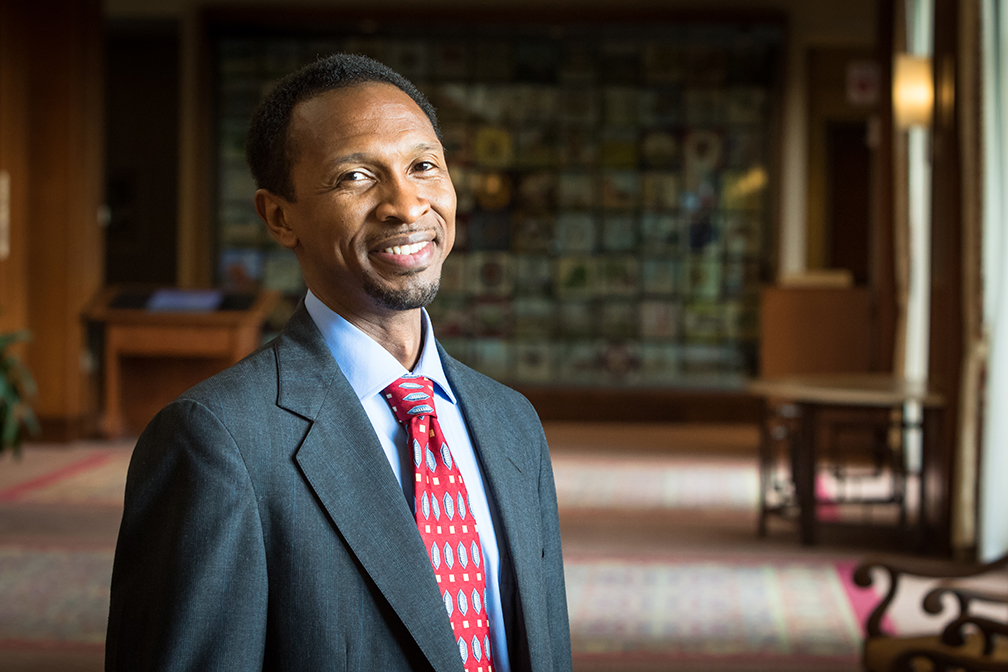Founding Director of the Center for the Humanities Named
June 8, 2017

Sylvester Johnson, an award-winning scholar engaged in exploring humanity in the age of intelligent machines, has been named director of Virginia Tech’s Center for the Humanities. He will also serve as the university’s assistant vice provost for the humanities.
The newly established Center for the Humanities, based in the College of Liberal Arts and Human Sciences, reflects Virginia Tech’s commitment to elevating the presence and profile of humanities disciplines across the university.
“We’re delighted that Sylvester Johnson will bring his compelling vision for infusing the intellectual life of our university with insights from the humanities,” said Rosemary Blieszner, interim dean of the College of Liberal Arts and Human Sciences. “We are confident that, with his leadership, Virginia Tech will become a model for other land-grant universities in placing humanities at the center of tackling complex, ever-evolving problems.”
Johnson currently serves as an associate professor of African-American studies and religious studies at Northwestern University. There, much of his research has focused on the intersection of religion, race, and colonialism.
When he joins Virginia Tech on July 1, Johnson will become a professor in the Department of Religion and Culture. He will maintain his office within the department, in Lane Hall, until renovations on the Liberal Arts Building are completed in the summer of 2018. The center will then have a significant physical presence there.
Payscale has consistently ranked Virginia Tech in the top 20 nationally for Best Value College for Humanities Majors. Nearly 1,500 undergraduates major or minor in one of the university’s humanities programs, which include the departments of English, Foreign Languages and Literatures, History, Philosophy, and Religion and Culture. Although those departments are all part of the College of Liberal Arts and Human Sciences, the new center will promote humanities across the university.
As director, Johnson will oversee programs that support individual faculty fellowships, departmental grants, and speakers, events, and colloquia in the humanities. He will also lead the college’s participation in several new digital publishing and digital humanities initiatives both within the university and nationally.
“As advancing technology continues to transform virtually every domain of modern life, the consequences for human relations — and humanity itself — only heighten the overarching significance of humanities research and teaching,” Johnson said. “After decades of handwringing over whether the expansion of technology threatens the relevance of the humanities, we’re beginning to witness our technological age pushing ‘big humanities’ questions to the forefront of our most urgent concerns.”
Johnson said it’s time for a new conception of university education.
“As we tackle the momentous challenges now emerging, we must ensure that humanities teaching and research take center stage,” he said. “The moment of the humanities is not behind us; it’s actually in front of us.”
Johnson is a founding co-editor of the Journal of Africana Religions. He has authored two books: African American Religions, 1500–2000: Colonialism, Democracy, and Freedom, published by Cambridge University Press in 2015 and a winner of the Choice Outstanding Academic Title Award, and The Myth of Ham in Nineteenth-Century American Christianity: Race, Heathens, and the People of God, a 2004 Palgrave MacMillan publication that garnered the American Academy of Religion’s Best First Book Award. Johnson also recently co-edited, with Steven Weitzman, The FBI and Religion: Faith and National Security Before and After 9/11, which the University of California Press published in February.
Johnson holds an M.A. and a Ph.D. in contemporary religious thought from the Union Theological Seminary, where he also earned an M.Phil. in systematic theology. He earned his bachelor’s degree in chemistry and education at Florida A&M University.
Written by Paula Byron







